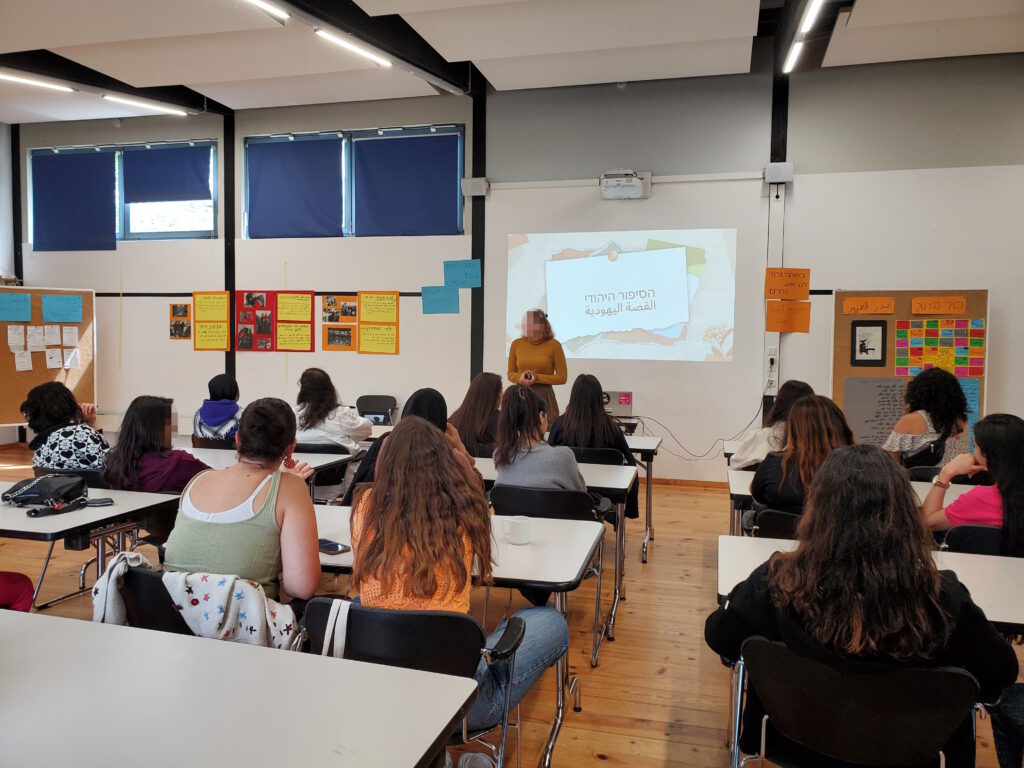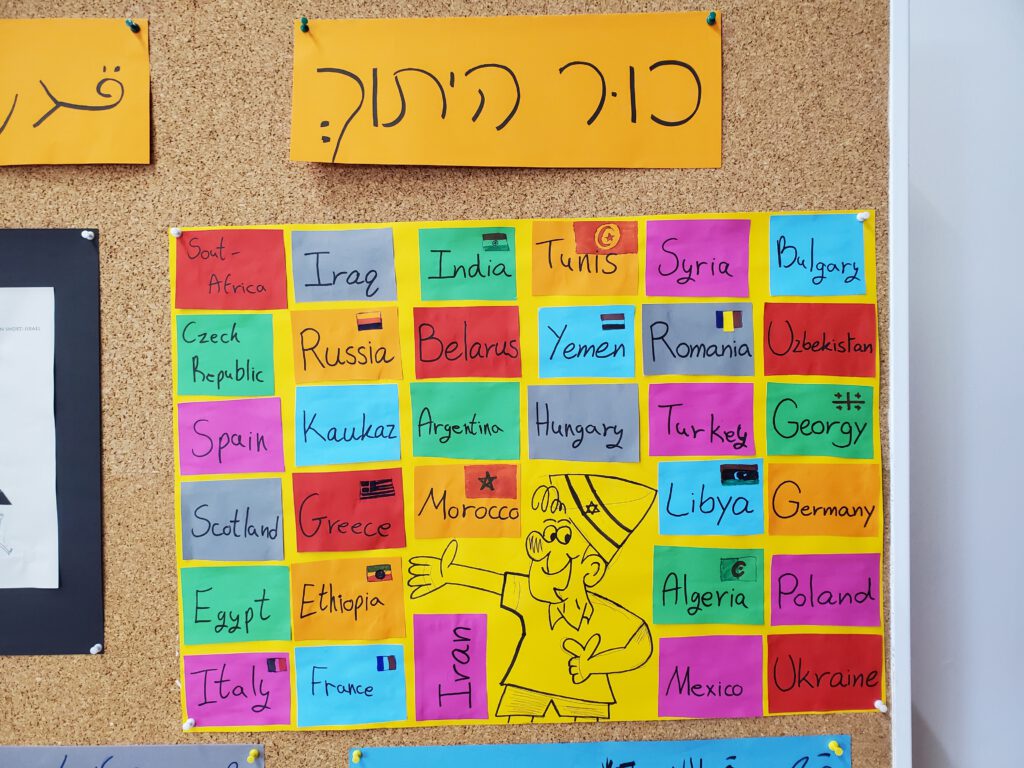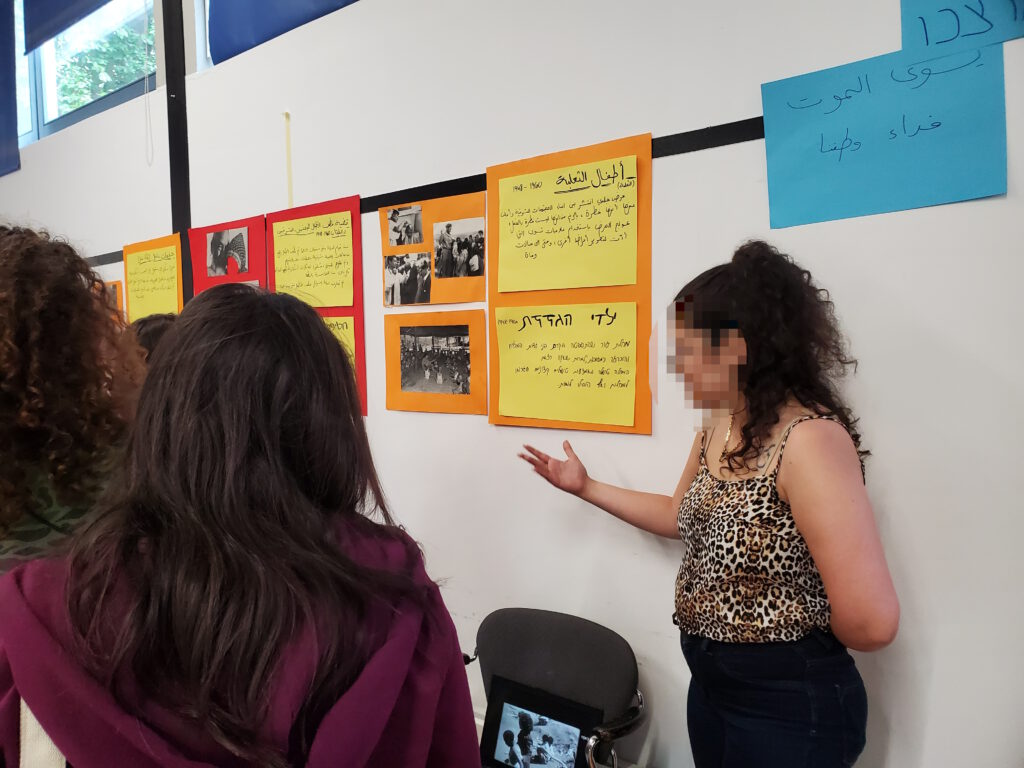Ella F. D. came to Israel from Azerbaijan with her mother as a small child. She describes her childhood and her relationship with her mother as not really good; she has always been a bit different – an outsider. She refused to do military service, not for ideological reasons, but simply to be against it and rebel against the system. It was only in recent years that she began to engage with the conflict, the occupation and the history of Zionism and became active in left-wing and anti-Zionist groups. In the excerpts from a longer interview, she talks to Tessa Pariyar about her identity, her motivation for coming to the seminar and her role in presenting the Israeli narrative.
Tessa Pariyar: How did you end up coming to the seminar?
Ella F.D.: I wanted to learn more, I want to have more tools (…)I wanted to come here also to see if I can actually talk. If I can actually first of all have compassion. (…) There was a point where I pretended not to be Israeli, ‘I don’t want to be Israeli’, [until] I understood that it’s not right and that I can’t exclude myself from the fact that I am Israeli, I am [part of] all these things that I hate and resist but in order to really do that I need to have more compassion for myself and for my potential friends, partners. And I need partners we all need partners to do this.
So I came here to learn more how to talk myself, how to speak, how to express my opinions because I never went to university, I did this course at Zochrot[1] six months ago and I remember all these terms, like ‘settler colonialism’ even, all these terms, I have heard them but they were so academic and the left in Israel is so white and privileged and there I felt how I’m less privileged (…)
When we were asked why are you going to the seminar in the first meeting a lot of the girls said to meet Palestinians. Of course, I want to meet them and I am happy to meet them, but this is not the reason why I came, I meet them every day. We can meet them, really. (…) I also have friends from the West Bank and I don’t need them to come here and tell me their personal stories to know what’s going on. I mean I really appreciate it a lot and also part of me asks why do they need to go through this for us? Why do we need to put them in this place? Let’s just send them on a vacation to have fun and we will do all the [stuff on our own], but I know it’s not how it is.
TP: This year, the Israeli group combined the exhibition of their historical narrative with a short performance. As part of a school lesson, they showed various aspects of Israeli history and how it is taught in most schools. You had a special role in it: somehow you were involved, but not really part of the performance. How did that happen?
EFD: So, we started the day and I was very optimistic to be honest (…) and Ava* and me said to each other ‘We’re not gonna let them just like completely portrait the narrative as Zionist propaganda, we’re gonna also say our thing. It’s not like I wanted to show just the Palestinian side, I understand that it is important to reflect in this narrative, also how we actually live and also what we are told in school. But I wanted to criticize it and there was a disagreement with criticizing it and they kept saying that yes, we can criticize it but when it came to the actual criticism it was too much and we kept trying and trying and there were a few outbursts between me and especially one person and at some point after 12 hours being there in the blue house [where the preparation of the narrative took place] I was at a point where I thought ‘That’s it. I’m done’. I didn’t say that but I needed a break and I went out. (…) I didn’t feel I have place in this thing and then Ava also came out and we just sat outside and talked and cried and basically felt frustrated that it’s here the same as it is in the real life and that we are not heard and that we choose to just curl up into a ball and cry rather than taking an action and it just killed us. (…) It just brought up so much stuff from the daily life and put a crazy mirror on everything, you just saw everything but in a close-up.

And then at some point we went back and I saw they did the ‘melting pot’ thing (Editor’s note: the fusion of immigrant Jews from all over the world into a unified Jewish nation with its own national culture, an ideal propagated by the early Zionists) and it made me want to puke. (…) This narrative of the melting pot, I grew up with it as it as if it’s like this amazing thing that’s supposed to make you unite with your people and all this bullshit. And when I started to learn more about Israeli history and Zionism and I still understand bits and pieces, I realized that the melting pot means basically: take someone, put him inside this pot and take out a racist. (…)

So, I saw this melting pot thing and even though, I had all the criticism, that I just said, I immediately looked from Azerbaijan. Did they remember where I come from? And I didn’t see it. And also the person who was working on it was from Iran and from the beginning I felt a connection between us, you know. she My roots are also in Iran and we’re very similar and you know we’re kind of Arab Jews in a way, Asian Arab, I don’t know what it is considered but we have a lot in common of our non-Zionist identity, and I saw in her from the beginning a partner also in that sense. And when I saw that there’s no Azerbaijan and she was doing it, I just asked her: ‘You couldn’t even put USSR?’ and she said ‘But we put Russia’ And I said ‘Yeah, but it’s not the same’, and then she said ‘But we put kafkaz’ (the Caucasus) and I ‘kafkaz is not a country’. They also put Georgia, Georgia is also in the Caucasus and I just felt how my identity, how, where I come from doesn’t matter, nobody sees you and when I was growing up as a little kid everyone called me kafkazik masricha, meaning ‘disgusting person from the Caucasus’ and she just put there a country named kafkaz and it just brought this all up so much how I’m not here and how I wasn’t seen and I just broke up in tears and I left and thought : “No, I am not participating in this. The way they portrayed it is not my narrative. My narrative is the way I experienced the whole day.”
TP: You then expressed your criticism by quoting well-known Zionists. How did you come up with that?
EFD: Ah, the quotes of the Zionists! I was exposed to them in the course I did in Zochrot and I think it’s a very good tool to use. (…) They say everything that the Israeli society denies on a daily basis. They just say it, they call themselves colonizers, they talk
about ethnic cleansing in their quotes, they talk about there will be no dukiyum in Palestine which is coexistence. They just say it all and they explain it the best. So, I just tried to find to every topic [that the others mentioned during the performance] the right quote, I did it as it was going on, right on the spot. I have a lot of quotes on my drive. (…)
In the morning; I was I’m not doing well, I didn’t even want to come in, I didn’t know what I was going to do, (…) I was in a state where I don’t want to see anyone, I curl up, I don’t want to talk, I need to be alone – that’s how I deal with problems sometimes. Then Elinor (Note of the Editor: One of the Israeli facilitators) came to talk to me and she told me that I have their full backing on doing whatever I want and that kind of made me feel much heard or gave me the feeling that they want to hear me.
And then also she told me that she and also other team members in their seminars when they were participants, didn’t participate in the narrative and they also did their own thing, they kind of objected it and that gave me some strength to do it.
TP: Until the end, we wondered whether your intervention was a planned part of the “school lesson”, the pupil rebelling against the teachers, or whether it was something spontaneous. We sensed that there was a certain tension in the group and between the other participants. But if it was spontaneous, how could your quotes be so well prepared?

EFD: I came to the seminar with this information to also share it with my Israeli colleagues so, like you said, I came prepared. And they hated me, they hated me even the next day. (…) But I am used to it. I’m just an angry person, I’m not friendly. Sometimes I’m friendly but I can look not very accessible and also my research about Zionism, kind of made it deeper. (…) I remember thinking this thought in the beginning when I just met the girls for the first or the second time and I remember them being nice to me and I already imagined how they will not be nice to me when they hear what I have to say. So today I feel how some of the people that were trying to be friendly with me in the beginning now are like taking distance. But it’s not all of them, there’s also a lot of people that are really amazing and I really connected with them even though maybe we think differently. (…)
TP: Before you said ‘I came to find some partners’, so do you think you found them?
EFD: Definitely a few, yes, not necessarily from the participants (laughing), no … but also from the participants.
[1] Zochrot is an Israeli human rights organization that provides information about the occupation and denounces it: https://www.zochrot.org/welcome/index/en
